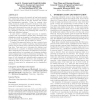Free Online Productivity Tools
i2Speak
i2Symbol
i2OCR
iTex2Img
iWeb2Print
iWeb2Shot
i2Type
iPdf2Split
iPdf2Merge
i2Bopomofo
i2Arabic
i2Style
i2Image
i2PDF
iLatex2Rtf
Sci2ools
146
click to vote
ICAIL
2005
ACM
2005
ACM
Effective Document Clustering for Large Heterogeneous Law Firm Collections
Computational resources for research in legal environments have historically implied remote access to large databases of legal documents such as case law, statutes, law reviews and administrative materials. Today, by contrast, there exists enormous growth in lawyers’ electronic work product within these environments, specifically within law firms. Along with this growth has come the need for accelerated knowledge management—automated assistance in organizing, analyzing, retrieving and presenting this content in a useful and distributed manner. In cases where a relevant legal taxonomy is available, together with representative labeled data, automated text classification tools can be applied. In the absence of these resources, document clustering offers an alternative approach to organizing collections, and an adjunct to search. To explore this approach further, we have conducted sets of successively more complex clustering experiments using primary and secondary law documents a...
| Added | 26 Jun 2010 |
| Updated | 26 Jun 2010 |
| Type | Conference |
| Year | 2005 |
| Where | ICAIL |
| Authors | Jack G. Conrad, Khalid Al-Kofahi, Ying Zhao, George Karypis |
Comments (0)

